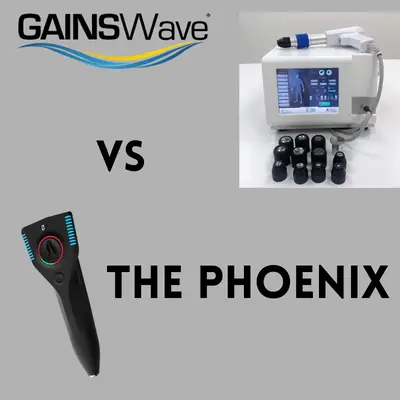If you’re asking this question, you’re probably concerned about the side effects of the drugs used to control pain associated with gout. So, looking for a drug-free solution, you’ve stumbled across TENS. Now you need to know if this may be what you’re looking for.
So, is a TENS unit good for gout? Potentially, yes. It seems to be accepted that there’s a valid scientific basis for TENS for relieving pain. But, conclusive evidence as to the types of pain it can alleviate, is lacking. However, it has virtually no side effects and is relatively cheap, so it’s probably worth trying.
If you are looking for how to place the TENS electrode pads for Gout check it out here
But, you’re not one to jump in with both feet based on a few lines you read on the internet. You’re going to want a fuller explanation, and that’s what you’re going to get here, so read on. Let’s start with some basics.
What Does a TENS Unit Do?
To understand what a TENS unit does, you need to understand what TENS is.
What is TENS?
TENS stands for Transcutaneous Electrical Nerve Stimulation. You can see why it’s abbreviated to TENS. To put it simply, TENS involves the electrical stimulation of the sensory nerves through the skin.
It’s a non-invasive pain control treatment, which is the primary reason people use it.
What is a TENS Unit?
Well, a TENS unit is the device that delivers the electrical impulse mentioned above.
It’s usually battery-operated, so portable, and has wires attached to conductive gel pads that you stick to your body. When you turn on the unit, you’ll feel the electrical impulse coming from the device to the area of your skin covered by the gel pads.
It’s not a painful feeling, but a tingling sensation, perhaps even tickly.
You can buy a TENS unit for home use over-the-counter, which makes them an accessible form of treatment.
How Does TENS Relieve Pain?
Preliminaries over, here’s where you’ll find the detail.
TENS uses a theory of pain known as gate control theory and is just one of several theories of pain. Some of the details of gate control theory have been described as oversimplified. However, it’s still accepted as a means of explaining pain in a non-scientific way.
So, as you’re probably looking for a jargon-free explanation, let’s go with it.
Pain messages from your sensory nerves travel to your brain via your spinal cord. Your brain is responsible for interpreting the signals it receives from your sensory nerves, and it controls how your body responds.
The theory is that pain messages can be blocked so that they never reach your brain. So, if it’s not receiving pain messages, your brain just tells your body you’re OK.
The means of blocking the pain signals is where gate theory comes in. It says that, within the spinal cord, there’s a gate mechanism. When the gate’s open pain messages pass from your spinal cord to your brain, however, this gate can be closed by non-pain messages.
Think of it as two roads running in the same direction up your spinal cord to your brain. One road carries pain messages, and the other carries non-pain messages.
The non-pain messages trigger a reaction that closes the road carrying the pain messages take to your brain. It’s as if a gate has been closed. The road carrying the non-pain messages remains open, so they still reach your brain. So, your brain only interprets those non-pain messages and tells your body that everything is normal. Therefore, you don’t feel pain.
The role that TENS plays is to stimulate your sensory nerves to produce these non-pain messages that trigger the blocking of the path of the pain messages.
Now, opinion on the effectiveness of TENS to alleviate all types of pain is divided. You shouldn’t assume that it will work in all cases. However, various studies do demonstrate a beneficial effect in some patients, with minimal risk of side-effects. Therefore, it’s considered to be at least a valuable addition to pain control strategies.
Will a TENS Unit Work for Gout?
To answer this question, you need to understand what gout is. It’s been associated with over-indulgence in the finer things in life and was often a source of humor.
However, if you’re suffering from it, you’ll know it’s far from a laughing matter. You’ll be aware that it can be very painful and debilitating.
If you are looking for how to place the TENS electrode pads for Gout check it out here
What is Gout?
So, essentially, gout is a form of inflammatory arthritis caused by an excessive amount of uric acid in the blood. In excessive amounts, uric acid forms needle-like crystals that cluster in the soft tissue of the joints. This results in swelling and, as you can imagine, pain at the joint. Typically it’ll be in the joint at the base of your big toe, but most joints can be affected.
Gout can progress from an acute condition to a chronic one if left untreated. The acute stage involves a sudden flare-up lasting for a short period, after which the pain is gone. If it becomes chronic, you’ll experience frequent and repeated bouts of intense pain.
What is the Treatment for Gout?
The conventional treatment for gout is anti-inflammatory drugs for the pain. There’s also separate medication to control the production and removal of uric acid from the body.
As with most drugs, there’s often a risk of side effects, which is probably one of the reasons you’re asking whether a TENS unit is good for gout.
Can TENS Treat Gout?
Well, as mentioned above, the drugs used to treat gout have two different functions. One type treats the symptoms, namely, the pain. The other treats the cause, namely, controlling the levels of uric acid in the body.
If TENS has any role to play as an alternative to drugs, it would only be for the treatment of the pain and not the cause.
So, as you’ve seen above, the evidence to support the effectiveness of TENS in treating pain isn’t considered to be conclusive. However, the uncertainty seems to concern the types of pain that can be treated. The principle of TENS as a method of pain relief does seem to be accepted as having some scientific basis.
Although there doesn’t appear to have been a study of the effectiveness of TENS specifically for gout, studies that included similar inflammatory arthritic conditions may help.
A 2007 analysis did look at results from multiple scientific studies that included patients with arthritis. It concluded that TENS was an effective treatment for chronic joint pain.
So, if your gout has reached the chronic stage, this analysis suggests that a TENS unit could help in relieving the pain.
However, if you’re still at the acute stage, the evidence to support the effectiveness of TENS is less clear. A 2015 review of the evidence relating to TENS as a treatment for acute pain found tentative support for it. But, it cautioned that the studies reviewed had inadequate sample sizes and incomplete reporting procedures, which could affect the reliability of the finding.
Conclusion
So, there’s some evidence to suggest that a TENS unit could provide relief from chronic gout pain, and possibly from acute gout pain. The scientific support seems to be stronger in relation to chronic pain, though still not conclusive.
However, whether you’re at the acute or chronic stage, given that:
- a TENS unit can be obtained at relatively low cost;
- There’s a low risk of side effects associated with the treatment;
- It can be self-administered as the need arises
Provided you’re not in a group for whom it’s not recommended, you might consider it something worth trying.
However, you should always take medical advice before undertaking any treatment.
Sources
- Uihc.org:transcutaneous-electrical-nerve-stimulator-tens
- Wikipedia: Transcutaneous Electrical Nerve Stimulation
- Wikipedia: Sensory Nerves
- Wikipedia: Non-Invasive Procedure
- Wikipedia: Conductivity
- pcpr.pitt.edu/Pain Mechanism: A New Theory, Melzack-Wall.pdf
- Wikipedia: Gate Control Theory
- Journals.physiology.org: Theories of pain from specificity to gate control
- Verywellmind.com: Gate Control Theory and the Brain
- Ncbi.nlm.nih.gov: Transcutaneous Electrical Nerve Stimulation (TENS)
- Nhs.uk: TENS
- Wikipedia: Gout
- Forbes: The Disease of Kings
- Wikipedia: Inflammatory Arthritis
- Wikipedia: Uric Acid
- Kidneyfund.org: Goutful: What’s the Difference Between Acute and Chronic Gout?
- Medicalnewstoday: Everything You Need to Know About Gout
- Healthtalk.org: Gout: Side Effects of Gout Medication
- ncbi.nlm.nih.gov/: Effectiveness of Transcutaneous Electrical Nerve Stimulation for Treatment of Hyperalgesia and Pain
- ncbi.nlm.nih.gov/: Efficacy of electrical nerve stimulation for chronic musculoskeletal pain: a meta-analysis of randomized controlled trials
- Cochranelibrary.com: Transcutaneous Electrical Nerve Stimulation for Acute Pain
- Wikipedia: Chronic Pain




